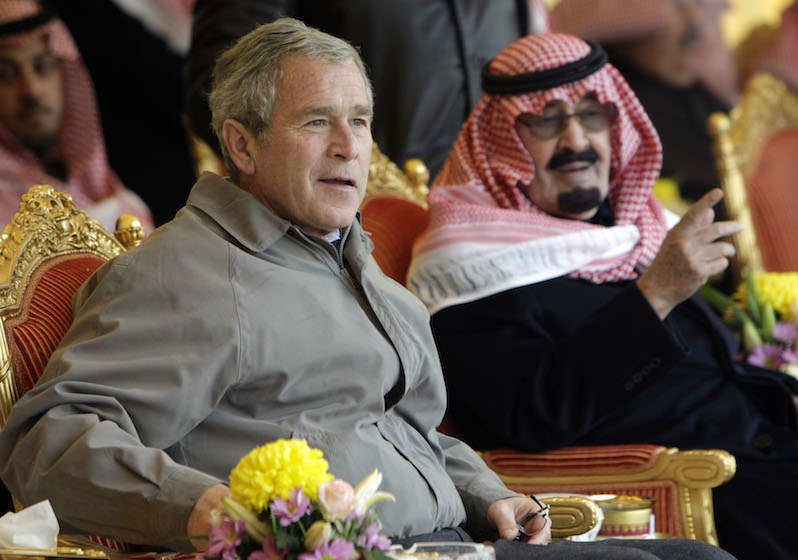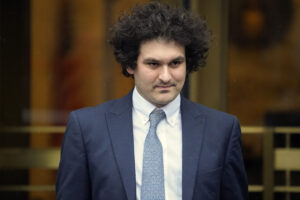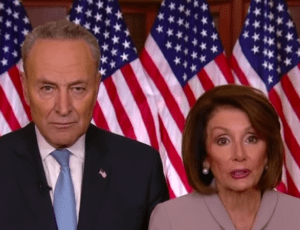When Will the ‘28 Pages’ From 9/11 Commission Report Be Declassified?
The redacted chapter could prove a direct link to 9/11 hijackers and Saudi Arabia, long considered a source of funding for al-Qaida. George W. Bush visited Saudi Arabia as a guest of the late Saudi King Abdullah bin Abdul Aziz al-Saud in January 2008. (Pablo Martinez Monsivais / AP)
George W. Bush visited Saudi Arabia as a guest of the late Saudi King Abdullah bin Abdul Aziz al-Saud in January 2008. (Pablo Martinez Monsivais / AP)
The 15-year anniversary of the 9/11 attacks is this September, and we still don’t know the whole story.
On Sunday’s edition of “60 Minutes,” Steve Kroft looked into a gaping hole that remains in the narrative—the “28 pages.” They are the final chapter from the report of the joint congressional inquiry into 9/11, and the redacted pages are believed to offer insights into what role Saudi Arabia played in the 9/11 attacks on America.
Fifteen of the 19 hijackers were from Saudi Arabia, and the country has been considered the chief source of funding for al-Qaida for many years. Since the 9/11 report was made public on Dec. 11, 2002, Bob Graham, chairman of the Senate Select Committee on Intelligence at the time, has worked to reveal all Saudi links to terrorists, but no link has been proved.
Kroft spoke with Graham and others who want the Obama administration to declassify the 28 pages, and the former senator said he remains “deeply disturbed by the amount of material that has been censored from this report.”
In 2002, the George W. Bush administration excised the 28 pages from the 9/11 report. Bush claimed that publication of the pages would jeopardize national security and “make it harder for us to win the war on terror.”
According to a 2014 New Yorker article titled “The Twenty Eight Pages,” that claim is false.
“There’s nothing in it about national security,” Walter Jones, a Republican congressman from North Carolina who has read the missing pages, contends. “It’s about the Bush Administration and its relationship with the Saudis.” Stephen Lynch, a Massachusetts Democrat, told me that the document is “stunning in its clarity,” and that it offers direct evidence of complicity on the part of certain Saudi individuals and entities in Al Qaeda’s attack on America. “Those twenty-eight pages tell a story that has been completely removed from the 9/11 Report,” Lynch maintains. Another congressman who has read the document said that the evidence of Saudi government support for the 9/11 hijacking is “very disturbing,” and that “the real question is whether it was sanctioned at the royal-family level or beneath that, and whether these leads were followed through.” Now, in a rare example of bipartisanship, Jones and Lynch have co-sponsored a resolution requesting that the Obama Administration declassify the pages.
The Obama administration, like the Bush administration, has refused to unseal the documents. But since Sunday’s “60 Minutes” report, calls are being renewed to release the documents. On Tuesday, Graham said he received a call from the White House and was told by Brett Holmgren, a senior policy adviser to the assistant to the president for Homeland Security, that a declassification review was underway and would be completed within months, the Tampa Bay Times reports.
Obama is headed to Saudi Arabia for a summit with Gulf leaders on April 21. U.S.-Saudi relations are strained due to the Western nuclear deal with Iran and a perceived lack of cooperation in fighting Islamic State. The latest revival of the 28-pages debate is unlikely to rebuild trust.
The Royal Embassy of Saudi Arabia responded to the “60 Minutes” report with a strong statement denying that the government of Saudi Arabia ever supported or funded al-Qaida.
Doubts will persist until the 28 pages are released.
Your support matters…Independent journalism is under threat and overshadowed by heavily funded mainstream media.
You can help level the playing field. Become a member.
Your tax-deductible contribution keeps us digging beneath the headlines to give you thought-provoking, investigative reporting and analysis that unearths what's really happening- without compromise.
Give today to support our courageous, independent journalists.



You need to be a supporter to comment.
There are currently no responses to this article.
Be the first to respond.